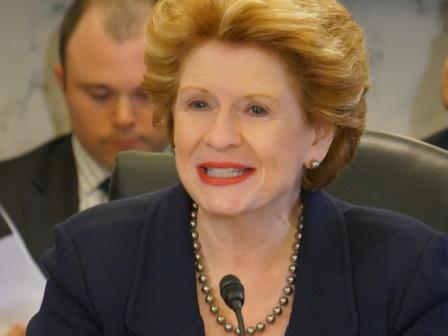
WASHINGTON, Nov. 30- Farm Bill hearings will resume at the end of January or the beginning of February, Senator Stabenow told Agri-Pulse today. She said the Senate Agriculture Committee will keep working with its counterparts in the House to continue fine-tuning Farm Bill negotiations, while using the $23 billion in deficit reduction outline prepared for the Joint Committee on Deficit Reduction as a foundation.
“We certainly feel comfortable that we presented a very credible deficit reduction number while creating an agricultural policy that supports farmers,” she said. “I’m very proud of the fact that rather than just talking about things like cutting down on duplication, consolidating, and streamlining, we’re actually doing that. We’ve looked at conservation programs --streamlining things for farmers as well as protecting natural resourcres.” Stabenow confirmed that, under the package produced for the super committee, conservation programs would be consolidated from 23 to 13.

Stabenow said that while the Agriculture Committees refrained from submitting final language to the “Super” Committee until it announced whether or not it could reach a deal, the Agriculture Committees did find $23 billion in net reductions, including an extra billion or so for specialty crops and other programs.
The Agriculture Committees plan to move forward with many of the proposed changes as the foundation for farm bill reforms, but she said that the final details from the proposed “super committee” package would not be released.
With the “Super” Committee’s failure, she said the across-the-board sequestration cuts that are scheduled for 2013 could be between $16-18 billion for agriculture and nutrition programs.
Asked whether farm bill discussions next spring would start with an estimated $23 billion in cuts or a number less than that, Stabenow said that part of the process is still undecided.
“There are a number of factors. For example, CBO will be looking at what our baseline is actually going to be going into the spring. They’ll take a look at the Conservation Reserve Program and I think we’re going to lose some baseline. I don’t know what the scores will look like.”
Stabenow said that changes to the commodity title, including the elimination of direct payments, a new revenue plan and new target prices, make crop insurance and other risk management programs the foundation for the farm safety net.
“We know that just doing traditional crop insurance, which is critically important, is not enough for some of our commodities in some of the regions of the country,” she said. “Crop insurance is going to be the mainstay, the foundation. The question is how we address shallow losses and commodities that don’t have successful crop insurance programs right now.”
Asked whether she might be open to offering the same $23 billion in proposed cuts that were developed for the super committee as some part of a future budget offset in 2012, Stabenow said she was very comfortable with the product.
“I feel good about the policy put together in a bipartisan way. I would feel comfortable if the opportunity presented itself because I think its credible, and it gives certainty to agriculture. I’m willing to do that. I would doubt that that it is going to happen. We’re proceeding right now with the idea that the next phase is to continue with hearings.”
#30
For more news, go to www.agri-pulse.com